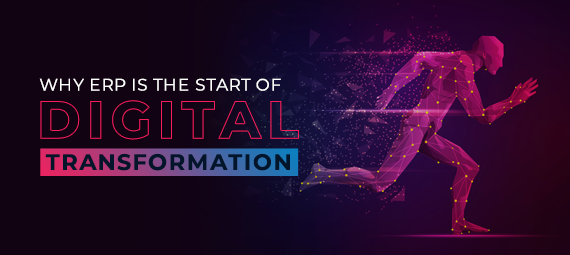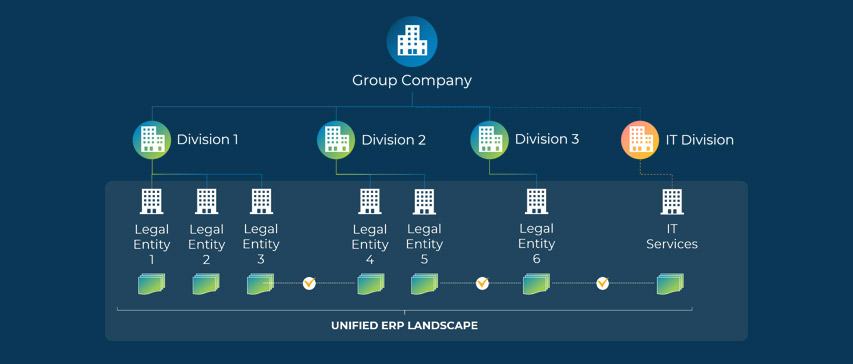
Let’s start at the very beginning. What is digital transformation after all?
It is the application of digital capabilities to processes, products and services that enhance operational efficiency and financial performance in an organization.
In this article today, we will analyze the role of ERP in digital transformation and why it is one of the cornerstones for any digital transformation in an organization.
Undeniably, ERP has a major impact on digital transformation. It is the core system that has the capability of bringing about revolutionary changes to the way business is carried out today. A digital transformation brings about significant changes to your organization which simplifies business processes and integrates all aspects of your business’ operations leading to greater efficiency and thereby, greater customer satisfaction. In other words, ERP is the core platform of your digital transformation.
Emerging technologies and ERP
These days, everyone is talking about emerging technologies – Artificial Intelligence (AI), Machine Learning (ML), Internet of Things (IoT), Blockchain, Robotics Process Automation (RPA) – the list goes on. There are many use cases for businesses to utilize these emerging technologies and given the range of options, it is easy for companies to get carried away and adopt most of these technologies. However, such adoption strategies often remain at the periphery and end up providing marginal benefits at best. What organizations really need to do is start looking at it from the core, and truly integrate these initiatives with the IT core – which is the ERP.

Organizations should typically start their digital transformation journey by addressing the need for modernization. In order to digitally transform their organizations, they need to modernize their digital core; in other words, the ERP. The ERP system is the custodian of all processes in an organization. As companies look to modernize their ERP, they need to take a look at their application strength in various functional areas. This, combined with the openness of the ERP platform to integrate with emerging technologies compound its value to organizations. This however, can be achieved only when use cases enabled by the emerging technologies are centered around the transactional data generated by the ERP system. This will ensure the organization always has a single version of truth across the entire enterprise.
Benefits from unified ERP landscape
As we mentioned above, the purpose of an ERP system, in the digital transformation journey, is to lend a unified, 360-view of the ins and outs of the business. Once deployed, it consolidates information received from every business unit and records it under one large integrated umbrella. The system makes data accessible to all stakeholders allowing them to make informed decisions around the business. The system also optimizes business processes across the organization, resulting in multiple benefits – from a decrease in maintenance costs, to an improvement in financial performance and greater customer satisfaction. Whether organizations opt for a cloud ERP, or an on-premise one, deployment of an ERP system will aid and assist in multiple aspects of the business, from data collection, to process optimization, or automation of daily tasks.

Furthermore, ERP helps employees navigate complex processes with a uniform workflow and automate repetitive processes, such as writing emails, reporting, billing, authorization and approval management.
Recently, we held an interactive webinar together with Oracle to explore the crucial role that Enterprise Resource Planning solution plays in the success of every digital transformation initiative. We discussed the importance of a homogenous IT enterprise core across all entities in a group of companies and why achieving such homogeneity is the critical first step in realizing the true benefits of any digital transformation initiative. You can watch the webinar for free here.
Business intelligence and ERP
A robust ERP system with strong reporting and analytical capabilities is a must have pre-requirement of every digital transformation initiative. In this way, managers will no longer need to ponder over spreadsheets and paper files. An ERP with inbuilt business intelligence tool enables organizations to schedule and create custom reports, all in real-time. The reporting process is completely automated, reducing the risk of human error drastically. With richer and accurate analytics, business intelligence can be built with an approach where traditional process-based ERP reports are augmented with data generated by the applications using the emerging technologies.
Scalability for organizations
The normal lifecycle of an ERP solution is between 8 and 12 years. Obviously, in this period the business transforms and grows both organically and through acquisitions. A key aspect of an ERP solution should be the ability to support such transformational changes that inevitably come with growth. Important among such capabilities is the ability to smoothly carry out post merger IT integration and the ability to integrate with niche applications that certain parts of the business might need. An open source ERP scales effortlessly to meet such requirements. This is driven by a fundamentally open architecture that enables integrations and enhancements that go along with the digital transformation initiatives.

ERP solutions built on proprietary technology have historically struggled in this area and have cost companies millions of dollars in failed implementation projects.
Post Pandemic Business World
As businesses are trying to recover from COVID-19, they will have to consider the option of modernizing their core ERP. In the post pandemic world, organizations across the world are looking at reducing operating costs and recovering some of the losses incurred during the pandemic.
Executives are under tremendous pressure to adopt a digital transformation strategy. While some are considering adopting services around their legacy core, the majority are evaluating the consequences of moving their ERP systems onto a modern cloud infrastructure for increased flexibility and agility.
Building new functionalities around the core ERP can help extend the life of legacy systems and organizations can still avail the benefits of innovation of the emerging technologies. Either way, since ERP systems form the core machinery in any organization, it is important that they support business processes optimally and completely integrate with the surrounding applications that are reliant on them.
ERP systems integrate all aspects of business operations and enhance the customer experiences. With most organizations moving to a digitally transformed business model, it is unthinkable to imagine managing inventory, procurement, integrating orders, supervising shipping and returns without an ERP system. One of the most important reasons to implement an ERP system is its capability to integrate all processes – finance, operations, HR to customer satisfaction – under one big all-encompassing umbrella. This is more relevant and necessary in the post pandemic world. Simply put, ERP is and will remain at the crux of every digital transformation initiative!
Act While There’s Still Time
Embarking on a digital transformation is a challenging journey. It is an expensive, time consuming and labor intensive process. However, once you make the transition to a modern, robust, flexible and efficient ERP system, you will realize the benefits are far higher than the ones provided by age-old manual processes. The transition helps organizations achieve operational efficiency and enhances their financial performance enabled by a strong enterprise level ERP system at the core, like the one offered by VIENNA Advantage.
